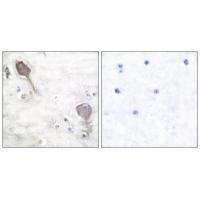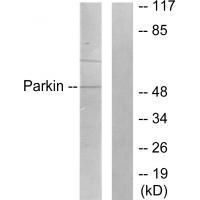Product Detail
Product NameParkin Antibody
Host SpeciesRabbit
ClonalityPolyclonal
PurificationThe antibody was affinity-purified from rabbit antiserum by affinity-chromatography using epitope-specific immunogen.
ApplicationsWB IHC
Species ReactivityHu Ms Rt
SpecificityThe antibody detects endogenous levels of total Parkin protein.
Immunogen TypePeptide
Immunogen DescSynthesized peptide derived from human Parkin antibody.
Target NameParkin
ConjugateUnconjugated
Other NamesPARK2; PRKN; PRKN2; Parkinson disease protein 2; Parkinson juvenile disease protein 2
Accession NoSwiss-Prot: O60260
NCBI Gene ID: 5071
Uniprot
O60260
Gene ID
5071;
Sdspage MW52kd
Concentration1.0mg/ml
FormulationRabbit IgG in phosphate buffered saline (without Mg2+ and Ca2+), pH 7.4, 150mM NaCl, 0.02% sodium azide and 50% glycerol.
StorageStore at -20˚C
Application Details
Western blotting: 1:500~1:3000
Immunohistochemistry: 1:50~1:100
Immunohistochemical analysis of paraffin-embedded human brain tissue using Parkin antibody #33464.
Western blot analysis of extracts from Jukat cells, using Parkin antibody #33464.
Western blot analysis of extracts from Jurkat cells using Parkin antibody #33464. The lane on the left is treated with synthesized peptide.
Functions within a multiprotein E3 ubiquitin ligase complex, catalyzing the covalent attachment of ubiquitin moieties onto substrate proteins, such as BCL2, SYT11, CCNE1, GPR37, STUB1, a 22 kDa O-linked glycosylated isoform ofSNCAIP, SEPT5, ZNF746 and AIMP2. Mediates monoubiquitination as well as 'Lys-48'-linked and 'Lys-63'-linked polyubiquitination of substrates depending on the context. Participates in the removal and/or detoxification of abnormally folded or damaged protein by mediating 'Lys-63'-linked polyubiquitination of misfolded proteins such as PARK7: 'Lys-63'-linked polyubiquitinated misfolded proteins are then recognized by HDAC6, leading to their recruitment to aggresomes, followed by degradation. Mediates 'Lys-63'-linked polyubiquitination of SNCAIP, possibly playing a role in Lewy-body formation. Mediates monoubiquitination of BCL2, thereby acting as a positive regulator of autophagy. Promotes the autophagic degradation of dysfunctional depolarized mitochondria (mitophagy), potentially by the ubiquitination of mitochondrial proteins. Mediates 'Lys-48'-linked polyubiquitination of ZNF746, followed by degradation of ZNF746 by the proteasome; possibly playing a role in the regulation of neuron death. Limits the production of reactive oxygen species (ROS). Regulates cyclin-E during neuronal apoptosis. In collaboration with CHPF isoform 2, may enhance cell viability and protect cells from oxidative stress. Independently of its ubiquitin ligase activity, protects from apoptosis by the transcriptional repression of p53/TP53. May protect neurons against alpha synuclein toxicity, proteasomal dysfunction, GPR37 accumulation, and kainate-induced excitotoxicity. May play a role in controlling neurotransmitter trafficking at the presynaptic terminal and in calcium-dependent exocytosis. May represent a tumor suppressor gene.
Fang Yang, J. Biol. Chem., Apr 2005; 280: 17154 - 17162.
Yukiko Kuroda, Hum. Mol. Genet., Mar 2006; 15: 883 - 895.
Iris H. Henn, J. Neurosci., Feb 2007; 27: 1868 - 1878.
Monica Joch, Mol. Biol. Cell, Jun 2007; 10.1091/mbc.E05-11-1027.
If you have published an article using product 33464, please notify us so that we can cite your literature.
et al,Study of mitophagy and ATP-related metabolomics based on β-amyloid levels in Alzheimer's disease. In Exp Cell Res on 2020 Nov 1 by Xiaomin Xiong, Shijie Li, et al..PMID: 32905804
, (2020),
PMID:
32905804
et al,Xinyin tablets affect mitophagy and cardiomyocyte apoptosis to alleviate chronic heart failure by regulating histone deacetylase 3(HDAC3)-mediated PTEN induced putative kinase 1(PINK1)/Parkin signaling pathway.
, (2025),
PMID:
40122315





 Yes
Yes



